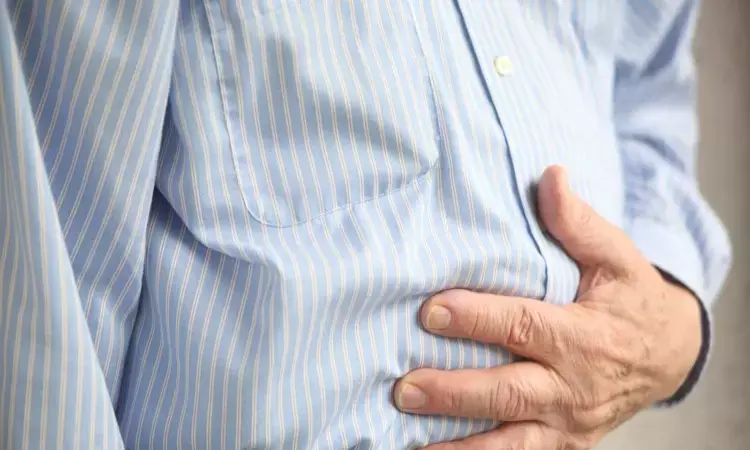- Home
- Medical news & Guidelines
- Anesthesiology
- Cardiology and CTVS
- Critical Care
- Dentistry
- Dermatology
- Diabetes and Endocrinology
- ENT
- Gastroenterology
- Medicine
- Nephrology
- Neurology
- Obstretics-Gynaecology
- Oncology
- Ophthalmology
- Orthopaedics
- Pediatrics-Neonatology
- Psychiatry
- Pulmonology
- Radiology
- Surgery
- Urology
- Laboratory Medicine
- Diet
- Nursing
- Paramedical
- Physiotherapy
- Health news
- Fact Check
- Bone Health Fact Check
- Brain Health Fact Check
- Cancer Related Fact Check
- Child Care Fact Check
- Dental and oral health fact check
- Diabetes and metabolic health fact check
- Diet and Nutrition Fact Check
- Eye and ENT Care Fact Check
- Fitness fact check
- Gut health fact check
- Heart health fact check
- Kidney health fact check
- Medical education fact check
- Men's health fact check
- Respiratory fact check
- Skin and hair care fact check
- Vaccine and Immunization fact check
- Women's health fact check
- AYUSH
- State News
- Andaman and Nicobar Islands
- Andhra Pradesh
- Arunachal Pradesh
- Assam
- Bihar
- Chandigarh
- Chattisgarh
- Dadra and Nagar Haveli
- Daman and Diu
- Delhi
- Goa
- Gujarat
- Haryana
- Himachal Pradesh
- Jammu & Kashmir
- Jharkhand
- Karnataka
- Kerala
- Ladakh
- Lakshadweep
- Madhya Pradesh
- Maharashtra
- Manipur
- Meghalaya
- Mizoram
- Nagaland
- Odisha
- Puducherry
- Punjab
- Rajasthan
- Sikkim
- Tamil Nadu
- Telangana
- Tripura
- Uttar Pradesh
- Uttrakhand
- West Bengal
- Medical Education
- Industry
Endoscopic full-thickness plication may reduce PPI usage and total reflux episodes in GERD patients, finds study

A recent meta-analysis published in the JGH Open Journal of Gastroenterology and Hepatology Foundation revealed that endoscopic full-thickness plication (EFTP) was effective in the treatment of gastroesophageal reflux disease (GERD), especially for patients unresponsive to conventional therapy.
GERD which is commonly managed with proton pump inhibitors (PPIs) is diagnosed in approximately 20% of adults in the United States. However, these medications are linked to potential long-term side effects, prompting the need for alternative solutions. The meta-analysis compared EFTP with a sham procedure as a treatment for refractory GERD. EFTP is a minimally invasive endoscopic technique designed to enhance the functionality of the gastroesophageal junction, addressing one of the root causes of GERD.
This research adhered to Cochrane guidelines and PRISMA standards in their systematic review. The study involved a total of 2144 screened articles, of which 3 high-quality randomized controlled trials (RCTs) with 272 patients met the inclusion criteria. Of these, 136 patients underwent EFTP, and the other 136 received sham procedures.
The analysis revealed strong evidence supporting the efficacy of EFTP. The patients who underwent EFTP demonstrated a significant reduction in dependency on PPIs when compared to the sham group. The relative risk (RR) was calculated at 0.51, with a 95% confidence interval (CI) of 0.35–0.73 (p < 0.01). This indicates a nearly 50% decrease in medication use.
EFTP led to over 50% improvement in GERD-Health-Related Quality of Life (GERD-HRQL) scores at the 3-month mark (RR 15.81; 95% CI 1.40–178.71; p = 0.03) which highlighted the effectiveness in reducing symptoms.
The DeMeester score which measures acid exposure in the esophagus, showed no significant difference between the EFTP and sham groups (mean difference 12.57; 95% CI −35.12 to 9.98; p = 0.27). While esophageal pH time showed no difference, EFTP significantly decreased the total number of reflux episodes, suggesting better control of GERD symptoms.
Overall, this study supports EFTP as a promising minimally invasive treatment for GERD, offering significant symptom relief and reduced reliance on PPIs. However, the need for further studies comparing EFTP with other advanced techniques to establish the most effective treatment approach is imperative.
Source:
Shahzil, M., Chaudhary, A. J., Qureshi, A. A., Hasan, F., Faisal, M. S., Sohail, A., Khaqan, M. A., Jamali, T., Khan, M. Z., Alsheik, E., & Zuchelli, T. (2024). Endoscopic Full‐Thickness Plication for the Treatment of Gastroesophageal Reflux Disease: A Systematic Review and Meta‐Analysis of Randomized Sham Controlled Trials. In JGH Open (Vol. 8, Issue 11). Wiley. https://doi.org/10.1002/jgh3.70056
Neuroscience Masters graduate
Jacinthlyn Sylvia, a Neuroscience Master's graduate from Chennai has worked extensively in deciphering the neurobiology of cognition and motor control in aging. She also has spread-out exposure to Neurosurgery from her Bachelor’s. She is currently involved in active Neuro-Oncology research. She is an upcoming neuroscientist with a fiery passion for writing. Her news cover at Medical Dialogues feature recent discoveries and updates from the healthcare and biomedical research fields. She can be reached at editorial@medicaldialogues.in
Dr Kamal Kant Kohli-MBBS, DTCD- a chest specialist with more than 30 years of practice and a flair for writing clinical articles, Dr Kamal Kant Kohli joined Medical Dialogues as a Chief Editor of Medical News. Besides writing articles, as an editor, he proofreads and verifies all the medical content published on Medical Dialogues including those coming from journals, studies,medical conferences,guidelines etc. Email: drkohli@medicaldialogues.in. Contact no. 011-43720751


